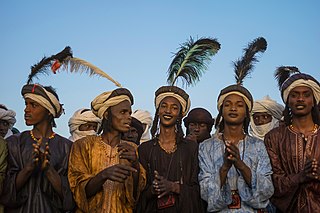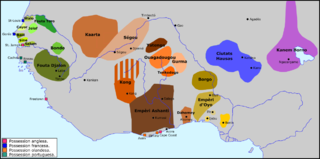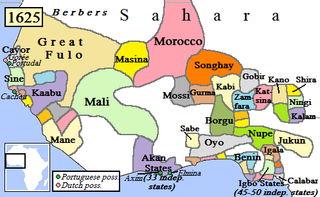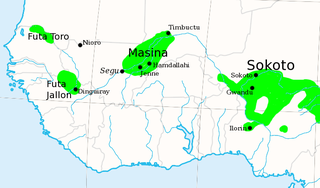
The Fula, Fulani, or Fulɓe people are an ethnic group in Sahara, Sahel and West Africa, widely dispersed across the region. Inhabiting many countries, they live mainly in West Africa and northern parts of Central Africa, South Sudan, Darfur, and regions near the Red Sea coast in Sudan. The approximate number of Fula people is unknown, due to clashing definitions regarding Fula ethnicity. Various estimates put the figure between 25 and 40 million people worldwide.

Bundu was a state in West Africa existing from the late 17th century until it became a French protectorate dependent on the colony of Senegal. It lay between the Falémé River and the upper course of the Gambia River, that is between 13 and 15 N., and 12 and 13 W.

The Toucouleur people or Tukulor people, also called Haalpulaar, are a West African ethnic group native to the Futa Toro region of Senegal. There are smaller communities in Mali and Mauritania. The Toucouleur were Islamized in the 11th century; their early and strong Islamic heritage, which is seen as a defining feature, is a "matter of great pride for them". They were among the first Muslims in the area that became Senegal. They were influential in the spread of Islam to West Africa in the medieval era.

Hadji Oumarûl Foutiyou Tall, born in Futa Tooro, present-day Senegal, was a Senegalese Tijani sufi Toucouleur Islamic scholar and military commander who founded the short-lived Toucouleur Empire, which encompassed much of what is now Senegal, Mauritania, Guinea and Mali.

The Tukulor Empire (1861–1890) was an Islamic state in the mid-nineteenth century founded by Elhadj Oumar Foutiyou Tall of the Toucouleur people of Senegal.

Futa Toro, often simply the Futa, is a semidesert region around the middle run of the Senegal River. This region, along the border of Senegal and Mauritania, is historically significant as the center of several Fulani states, and a source of jihad armies and migrants to the Fouta Djallon.

The Empire of Great Fulo, also known as the Denanke Kingdom or Denianke Kingdom, was a Pulaar kingdom of Senegal, which dominated the Futa Toro region from the early 16th century to 1776.
The Char Bouba war, also known as the Mauritanian Thirty Years' War or the Marabout War, took place between 1644 and 1677 in the tribal areas of what is today Mauritania and Western Sahara as well as in the Senegal river valley. It was fought between the Sanhadja Berber tribes and Muslim populations in the river valley, led by Lamtuna Imam Nasr ad-Din, on one hand; and the Maqil Arab immigrant tribes, foremost of which was the Beni Hassan, as well as the traditional aristocracies of the Wolof states on the other, supported by the French.

The Imamate of Futa Jallon or Jalon, sometimes referred to as the Emirate of Timbo, was a West African Islamic State based in the Fouta Djallon highlands of modern Guinea. The state was founded in 1725 by a Fulani jihad and became part of French West Africa in 1896.

The Yalunka, or Dialonké, are a Mandé-speaking people and the original inhabitants of Futa Jallon, a mountainous region in Guinea, West Africa. The Yalunka people live primarily in Guinea, particularly in Faranah, while smaller communities are found in Kouroussa. Additional Yalunka are also located in northeastern Sierra Leone, southeastern Senegal, and southwestern Mali.
Almami was the regnal name of Tukulor monarchs from the eighteenth century through the first half of the twentieth century. It is derived from the Arabic Al-Imam, meaning "the leader", and it has since been claimed as the title of rulers in other West African theocratic monarchies.
Shaykh Thierno Sulayman Bal was an 18th-century African leader, warrior, and Islamic scholar, from the Futa Toro region in what is today Senegal.

The Fulajihads sometimes called the Fulani revolution were a series of jihads that occurred across West Africa during the 18th and 19th centuries, led largely by the Muslim Fulani people. The jihads and the jihad states came to an end with European colonization.

Karamokho Alfa was a Fula religious leader who led a jihad that created the Imamate of Futa Jallon in what is now Guinea. This was one of the first of the Fulbe jihads that established Muslim states in West Africa.
The Torodbe; singular Torodo were Muslim Toucouleur clerics and theocratic monarchs who preached and reigned in Futa Toro, a region located in the north of present-day Senegal, and other Fula communities in West Africa from at least the seventeenth to the early twentieth century. Drawn from all ethnicites and levels of society, the Torodbe aimed to 'purify' the Islam practiced in West Africa and establish Islamic states run with Islamic law.
Thilogne is a town in northeast Senegal with the status of a commune. It lies in the Matam Department of Matam Region, 20 km (12 mi) from Kaédi, Mauretania and connected to Dakar via the N2 road.
Tenguella was a Fula silatigi or chief who founded a short-lived state in the upper Senegal river valley, a precursor of the Empire of Great Fulo. He was referred to as the Great Fulo or Great king of the Fulos in Portuguese documents of the time.
Abdul Kader Kan was an 18th-century Islamic scholar and military leader, and the first Almaami of the Imamate of Futa Toro, hailing from what is now Senegal.
The Soninke-Marabout Wars were a series of 19th-century civil wars across southern Senegambia pitting the traditional ruling classes of various states, mostly animist or only nominally Muslim, against Islamic reformers led by the marabout class. French and British forces frequently became involved in these conflicts, providing them an opportunity to extend colonial power into the hinterland.













